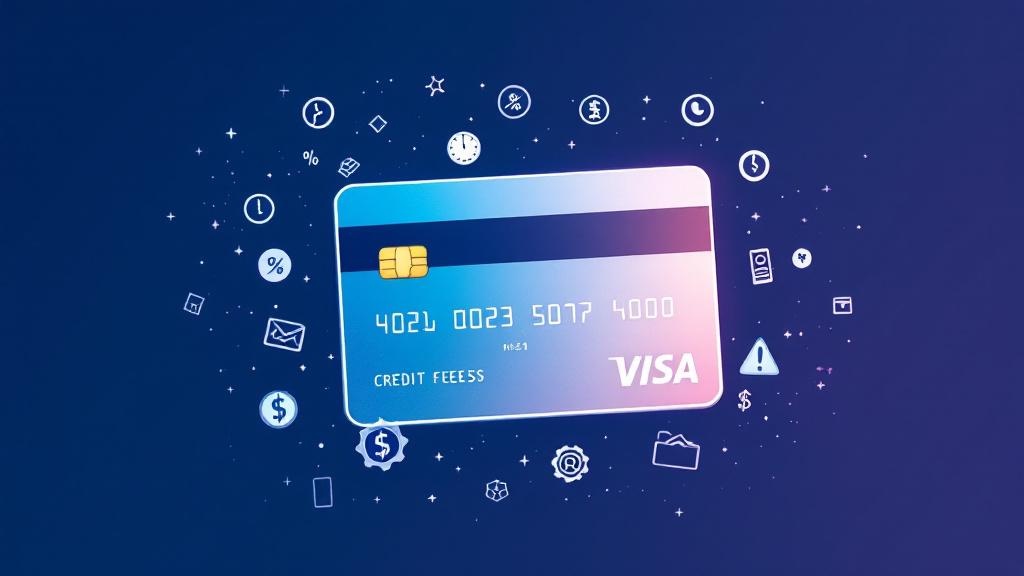Credit cards are an essential part of modern life, offering convenience, rewards, and the ability to manage purchases over time. However, they come with a catch—hidden credit card fees. These charges can sneak up on you, eating into your finances without you even realizing it. In fact, many people aren’t aware of the full range of credit card fees until they see them reflected in their statements.
In this article, we’ll uncover seven common hidden credit card fees, explain how credit card companies hide fees, and provide practical tips on how to avoid these hidden charges. Whether you’re a seasoned credit card user or a newbie, understanding these fees will help you make better financial decisions and save money in the long run.
1. Foreign Transaction Fees
When you use your credit card abroad or for international online purchases, you might be hit with a foreign transaction fee. This fee is typically between 1% and 3% of the transaction amount, and it’s charged by your card issuer for processing payments in a foreign currency. Although this fee is common, many credit card companies don’t make it obvious until you receive your statement.
How to Avoid Foreign Transaction Fees:
-
Choose a credit card with no foreign transaction fees: Many travel rewards cards or premium cards offer this perk. If you travel frequently, switching to a card that doesn’t charge this fee can save you a lot of money.
-
Pay in local currency: When making an international purchase, always opt to pay in the local currency rather than USD, as currency conversion fees can increase the total cost.
2. Late Payment Fees
Late payment fees are one of the most common credit card fees, and they can quickly add up. If you miss a payment or fail to pay your bill on time, most credit card companies will charge a late payment fee, usually ranging from $25 to $40.
While this fee is explicitly stated on your cardholder agreement, it can still catch you off guard if you’re not careful about due dates.
How to Avoid Late Payment Fees:
-
Set up reminders or automatic payments: Many credit card companies offer an option to set reminders for payment due dates or even automate the payment process, ensuring you’re always on time.
-
Pay more than the minimum: Paying only the minimum balance may lead to interest charges and additional fees. Paying off your balance in full every month helps you avoid not just late fees but also interest.
3. Cash Advance Fees
If you use your credit card to withdraw cash from an ATM, be prepared for hefty fees. Cash advances often come with a fee ranging from 3% to 5% of the transaction amount. Plus, interest on cash advances typically starts accruing immediately, and it’s usually at a higher rate than regular purchases.
How to Avoid Cash Advance Fees:
-
Avoid using credit cards for cash withdrawals: It’s best to use your debit card for ATM withdrawals or other methods of accessing cash.
-
Explore low-interest personal loans: If you need cash, consider applying for a personal loan instead of a cash advance on your credit card, as interest rates can be more favorable.
4. Over-the-Limit Fees
If you exceed your credit card’s credit limit, your issuer may charge an over-the-limit fee. While this fee isn’t as common as it once was due to new regulations, some credit card issuers still charge it, and the fee can be as high as $40.
Credit card companies are required to obtain your permission before allowing charges that exceed your limit. However, if you’ve opted in, this fee could hit your wallet unexpectedly.
How to Avoid Over-the-Limit Fees:
-
Monitor your credit card balance: Regularly checking your credit card balance can help you stay aware of your spending and avoid exceeding your credit limit.
-
Request a credit limit increase: If you frequently come close to your credit limit, consider requesting a higher credit limit from your issuer. This can help avoid over-limit charges.
5. Annual Fees
Some credit cards come with annual fees, which can range from $25 to several hundred dollars. While these fees are often associated with premium rewards cards, they can still be a hidden cost if you’re not expecting them.
If you’re not maximizing the benefits of a credit card with an annual fee, it might not be worth keeping it.
How to Avoid Annual Fees:
-
Look for no-fee cards: Many credit cards offer no annual fee, which can save you money while still providing useful rewards and benefits.
-
Evaluate the benefits: If you’re considering a card with an annual fee, make sure the rewards or perks (like travel insurance, cashback, or discounts) justify the cost.
6. Balance Transfer Fees
Transferring debt from one credit card to another can be a great way to save on interest, especially with introductory 0% APR offers. However, balance transfer fees can often surprise cardholders. These fees are usually 3% to 5% of the balance being transferred.
If you’re trying to consolidate debt, it’s essential to factor in these fees before making the transfer.
How to Avoid Balance Transfer Fees:
-
Look for 0% APR cards with no transfer fees: Some credit cards offer balance transfers with no fees, especially as part of a promotional offer.
-
Pay off the balance quickly: If you do transfer a balance, aim to pay it off within the introductory period to avoid paying interest.
7. Returned Payment Fees
Returned payment fees occur when your payment bounces due to insufficient funds in your account or other reasons. This fee is typically around $25 to $40 and is in addition to any overdraft fees from your bank.
How to Avoid Returned Payment Fees:
-
Ensure sufficient funds: Always make sure you have enough money in your account before making a payment.
-
Set up alerts: Many banks and credit card issuers offer alert systems to notify you of low account balances.
How Credit Card Companies Hide Fees
Credit card companies are legally required to disclose fees, but they often hide them in the fine print or make them difficult to understand. For example, some fees may only be disclosed after you’ve signed up for the card or used it a few times. Additionally, terms like “APR” (annual percentage rate) can sometimes be misleading, making it harder for consumers to grasp how fees will affect them.
Tips for Avoiding Hidden Fees:
-
Read your cardholder agreement: While it might be long and tedious, reading the terms and conditions can help you identify any hidden fees upfront.
-
Compare cards: Before choosing a credit card, compare multiple options to find one that minimizes fees while maximizing benefits.
-
Contact customer service: If you’re unsure about any fees on your card, don’t hesitate to ask your credit card issuer for a clear explanation.
Conclusion: How to Avoid Credit Card Charges
Hidden credit card fees can add up quickly and take a significant chunk out of your finances. By staying vigilant, reading the fine print, and choosing credit cards that align with your needs, you can avoid most of these sneaky charges. Keep track of your due dates, avoid unnecessary cash advances, and always choose cards that provide the most value for the least cost.
Key Takeaways:
-
Avoid foreign transaction fees by using cards with no foreign fees.
-
Set up automatic payments to steer clear of late payment fees.
-
Never use your credit card for cash advances if you can avoid it.
-
Keep an eye on your credit limit to prevent over-the-limit fees.
-
Consider no-annual-fee cards or ensure the perks justify the cost if you have to pay one.
-
Always weigh the costs of balance transfer fees when consolidating debt.
By being proactive and informed, you can make the most of your credit card without falling victim to hidden fees.
FAQs
1. What are the hidden fees on credit cards?
Hidden fees on credit cards are often unexpected charges that you may not realize you’ll incur until they appear on your statement. These include fees like foreign transaction fees, annual fees, late payment fees, and more.
2. How can I avoid hidden credit card fees?
To avoid hidden credit card fees, read the fine print, stay aware of your spending habits, and choose a credit card that aligns with your financial needs. Set up reminders for payments and ensure you understand all the fees associated with your card.
3. What are some common credit card fees I didn’t know about?
Common credit card fees include foreign transaction fees, annual fees, cash advance fees, and over-the-limit fees. These can add up quickly if you’re not careful.
4. Are there fees hidden in credit card statements?
Yes, some fees can be hidden in the fine print or not immediately obvious on your monthly statement. Always review your cardholder agreement to spot any potential fees.
5. How do credit card companies hide fees?
Credit card companies may bury fees in complex terms and conditions, making them difficult to spot. They may also apply fees after you’ve used the card, like charging late payment fees after a missed payment.
6. How can I reduce credit card fees and charges?
To reduce credit card fees, pay on time, avoid cash advances, and ensure you don’t exceed your credit limit. Choose a card with no foreign transaction fees and one that doesn’t have an annual fee.
7. What’s the best way to avoid credit card charges?
The best way to avoid credit card charges is by monitoring your spending, reading your cardholder agreement, paying off your.








Comments (0)